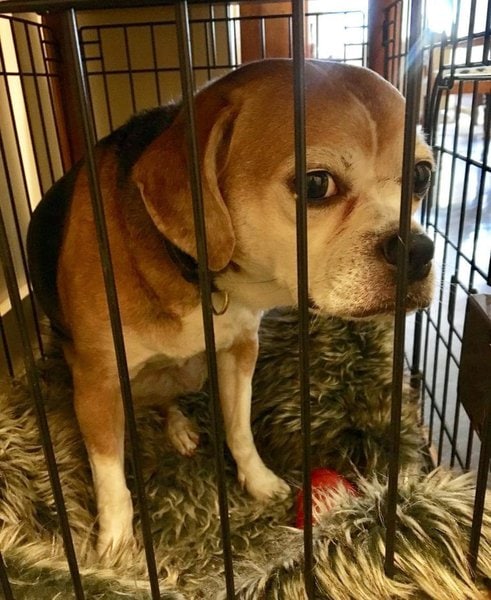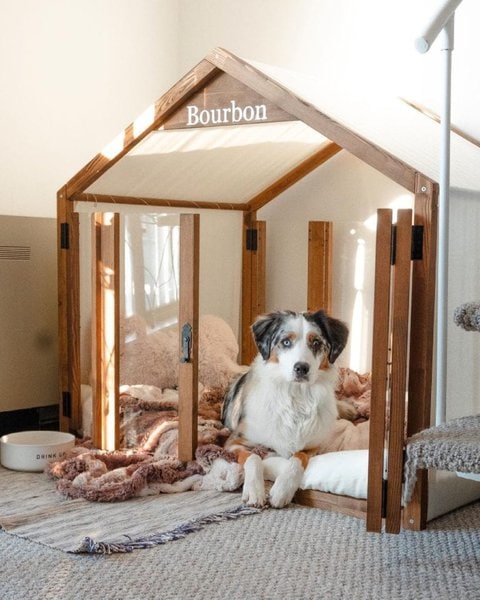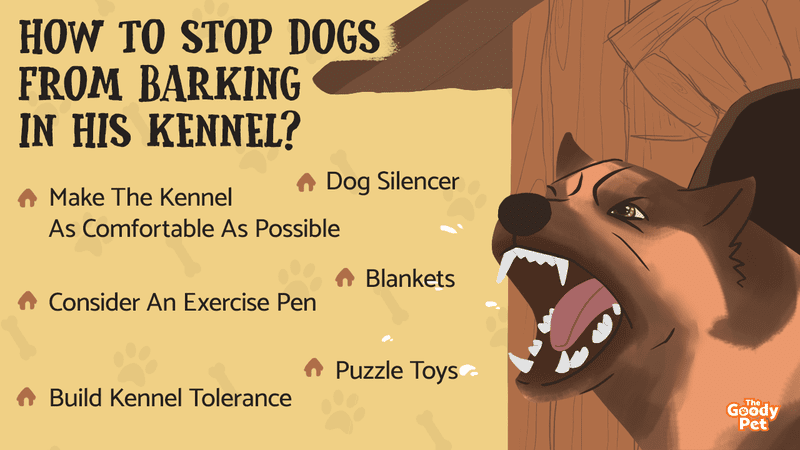A dog’s kennel is a place of comfort. Once a dog starts to bark incessantly in its kennel, it may be a sign that something is wrong.
The main reason is that they could be stressed or anxious. Many dogs are extremely sensitive and can react to their surroundings by barking out of fear or frustration. The kennel environment itself can also cause stress for some animals if it is too loud, dirty, overcrowded, or uncomfortable.
Let’s take a deeper look at all the reasons for this behavior and most importantly, how to go about fixing and correcting it in a safe and healthy manner.
Why Do Dogs Bark In Kennel?
The reasons why dogs bark in a kennel, as noted earlier, are multifaceted.
To pinpoint a particular reason for a particular scenario, you would first have to establish the conditions responsible in the first place.
Excitement
For instance, incessant barking in a kennel could be a case of excited barking if it happens at a time when you’re on your way out of the house or are just returning.
Your dog sees you and gets excited; wants to run at you and jump and play, but it obviously can’t, thanks to the restrictions of the kennel – hence the barking.
Separation Anxiety
This is also a general indication of separation anxiety, which is one of the major reasons dogs bark in a kennel.
Anxiety-driven barking is not just limited to separation anxiety, though. It also occurs during external events that are capable of causing great fear to a pooch.
For instance, when there’s a loud noise and thunderstorms, it is normal for a dog to react to the anxiety by barking nervously.
Boredom
Another condition that can help understand what it means when a dog barks non-stop in a kennel is when this happens at night. A dog barking at night when there’s nothing going on is usually an indication of boredom.
It is quite understandable, too, seeing as even humans who are left alone by themselves with no stimulating activity tend to get excited and develop a good amount of pent-up energy.
And while we may expunge our energy by running, or working out, a dog left in a kennel at night does not have this luxury, and will instead choose to deal with it through nervous barking all of a sudden.
Will Dogs Eventually Stop Barking In Kennel?

If your dog doesn’t stop barking in the first few hours, then there really is nothing to indicate that the barking will stop all of a sudden on its own.
Not to mention that most of the time, a dog barking in a kennel is a slippery slope.
Once your pooch starts to bark without interruption in the first couple of days, there’s a good chance that this will lead to a sort of normalization of the act.
So that instead of stopping on its own, the barking continues and escalates into even more frustrating forms at night.
And all of a sudden as you’re wondering how long your dog can bark until it gets tired, it shows you just how long – which is very, very long – and the neighbors start to complain.
The solution to the question may also be a question of the conditions triggering the barking in the first place, just as outlined above.
In a case where barking is due to separation anxiety, there may be a higher chance that the barking eventually stops for a while on its own without intervention, and then continues later.
In a case where nervous barking is due to other forms of fear, or in a scenario where it is based on boredom and consistent potty urges, then there really is no indication that the barking will go away on its own. You will most likely have to intervene in one form or the other.
At any rate, it is always better to take proactive action to stop your dog from barking in the kennel or kennel than to ignore the poor pooch entirely.
How Do I Get My Dog To Stop Barking In His Kennel?

Having established that it’s a bad idea to wait and see if your dog gets tired of barking on its own, the next logical step is to come up with actionable plans to stop your dog from barking in a kennel.
Below are a few good methods known to have high efficiency and highly favorable results:
Make The Kennel As Comfortable As Possible
The first step to getting your dog to stop barking in a kennel is to make it as hospitable and safe as possible.
It is a process that takes some getting used to for any dog, but you can make it a lot easier when the environment Itself is as neat, calm, and exciting as possible.
Consider An Exercise Pen
A large pen may be a better option than a crate or a kennel simply because of the amount of space it spans.
Being confined in a relatively small space may trigger a higher dose of anxiety than having more space to run, sleep, and play around.
This also solves the problem of boredom to an extent.
Puzzle Toys
Speaking of boredom, it is always a good idea to keep a barking dog as occupied as possible. It makes them get less anxious and even less bored. Puzzle toys or any other kind of interactive toys are great for this purpose, and particularly stop your dog from barking at night.
Build Kennel Tolerance
In cases where there just isn’t enough space for an exercise pen, your dog has no choice but to get used to the kennel. You can help build tolerance by easing your pooch into the experience.
For instance, you can start with lesser minutes overall to stop your dog from barking in the morning, and then work your way up into overnight stays.
What Are The Best Devices To Stop Dog Barking?
In case you’re looking to get even more creative and work with gadgets and devices, there is a handful of these that have been proven to do a good job at getting dogs to stop barking especially in a kennel.
Blankets
First on the list is a blanket. Yes, you read that right – a blanket. And you might be wondering if putting a blanket over a dog kennel helps. Well, it does and its purpose, in this case, is multi-pronged.
Firstly, it plays a very important role in making the kennel as cozy and warm as possible. This ensures that it provides a feeling of protection for your dog, thereby ensuring less propensity to anxiety and insecurity.
At the same time, it also provides a soundproof effect for the kennel . This way, the neighbors won’t get riled up if barking starts for some reason.
This moving blanket for pets and picnics is our recommendation if you plan to get one. It offers the required level of protection and is versatile enough to be employed towards other means once you have the situation in control.
Dog Silencer
Another device you might want to consider is the JZORI anti-barking control device, which is a device capable of automatically detecting barking from about 50 feet out. After detection, it emits a sound that only the dog can hear, which prompts it to stop immediately.
The device then automatically shuts Itself off once barking has stopped.
Now you may be wondering whether or not using this dog silencer device is humane, well I’d like you to know that the frequencies it emits are absolutely safe, harmless to the dog, and completely inaudible to the human ear.
Other devices capable of playing the role perfectly include chew toys, essential oils, and bark collars.
How Do I Teach My Puppy To Self-Soothe?
Is it even possible to teach a dog to soothe itself and calm itself whenever anxiety starts to set in? Well, yes. Yes, it is.
With the help of certain innovative devices, it is indeed possible to take away virtually all the inconveniences that come from tending to a barking dog in a kennel and let the devices handle the rest.
With the help of these amazing devices, you can give your dog pretty much everything it needs to stay calm and focused.
Virtual Companion
The first among them is the Furbo Dog Camera, a device capable of live-streaming videos of your pet with its 2-way audio feature. And it is also capable of tossing treats!
All of this makes it remarkably easier to efficiently take care of your pup from a remote location.
And what’s more. You don’t even have to worry about either of you suffering from separation anxiety anymore.
Interactive Toys
Consider interactive toys such as the Cooway interactive laser toy.
This is an auto-rotating laser pointer programmable into quick or slow flashing modes.
Its unpredictability and customizations make it a perfect toy that your furry friend is most probably never going to get bored of in a long time.
This toy can keep your pet entertained at home or in the yard at night and expend their energy.
Before they know it, your dogs will become all too tired to bark anymore.
Puzzle Toys
A final option to consider in this regard is puzzle toys. These toys can make your pooches self-entertain themselves and keep them preoccupied in their kennels.
One great toy is the Nina Ottoson interactive “Treat Maze” puzzle toy. The objective of the game is to keep your dog’s mind concentrated and engaged and provide a treat as a reward.
All you have to do is load the treat on either side of the saucer and you’re free to go do whatever you have to, while the toy handles the rest.
Related Questions
Is It Cruel To Crate A Dog At Night?
No, it is not cruel to crate a dog at night. A dog can be placed in a crate at night for security and other viable reasons. It is only considered cruel when this is done without meeting all of the pooch’s needs, which include proper ventilation, feeding, and toys. A crate or kennel can also give a dog a sense of homeliness.
Where Should My Dog Sleep At Night Time?
A crate or a kennel is a viable option for your dog to sleep at night. There are also other options including having your dog sleep in your bed; in a different bed in your room; or in a different bed in a different room. Either way, what is most important is to have a set routine and stick to it consistently.
Do Dogs Get Tired Of Barking?
Dogs generally don’t get tired of barking. There have been instances of dogs barking for an unfathomable amount of time. So it would be a bad idea to expect this to happen on its own. It is worth noting, though, that a tired dog may tend to bark less. Of course, the tiredness here is not necessarily a product of the barking, but of other external stressors.





